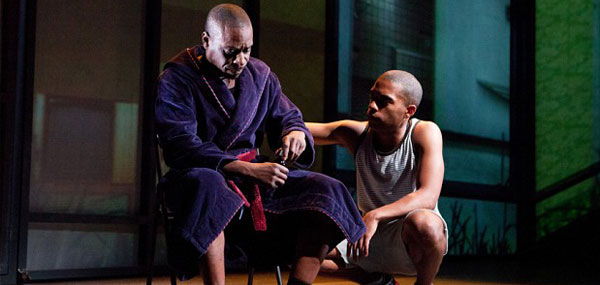

Power struggles, economic disadvantages, defiance to the law, consumerism and the search for personal independence from norms and manipulation are all part of the plot of The Loneliness of the Long Distance Runner playing for a limited engagement (Jan21-Feb7) at the Atlantic Theater in New York City.
The original short story written in the 50’s by english writer Allan Sillitoe, takes place in the historical context of post WWII, where politics and a culture of consumerism created constant class struggles in England. As part of a literary group labeled “Angry young man”, the author remains true to its original message when in 1962 he adapted the story for the big screen under the “British New Wave” movie genre. Both movements questioned the status quo and intended to draw attention to the realities of the working class, as well as their desire to acquire material things pushed on by a capitalist system and enjoyed mainly by the ruling elite.
For this stage adaptation, Roy Williams adapted the story by utilizing a mainly black cast in order to reflect current racial issues, he also brings the story to date by including elements of 21st century life. The embodiment of the plot is represented by teenager Colin Smith (Sheldon Best), who resorts to petty crimes and is confounded with a moral and personal dilemma brought on by his late father’s (Malik Yoba) righteous advice and the pressure of his peers. The youngster finds himself in hot water and sent to a juvenile center for a robbery he committed. Inside the center, he is challenged by a social worker (Todd Weeks), who has apparently seen Colin’s potential as a contender for a national student race against preppy youngsters. As the process of Colin’s training takes place, he starts pondering on his values and shaping his thinking. He constantly battles his inner desire to prove everyone else that he is better than hey deem him to be, yet he can’t leave behind the image that has made him respectable amongst his friends. This is a coming of age story where introspection leads to finding yourself and becoming free of control, not only from material things but from one’s own bad decisions.
In this dynamic 80 minute production, not one minute goes to wasted on superfluous dialogue. Sheldon, an appealing young man who flaunts an outstanding physique, flawlessly carries on his monologues while jogging in place for almost the entire show, expelling an energy that carries on till the end. An element of romantic relief is cleverly incorporated to make the youngsters character relatable. The transitions between future, present and past are seamless even though they take place in an almost static backdrop. The stage is setup whereby a few moving panels create the changes between scenes, yet the lighting and video projections go a long way in situating the spectator in the right place without being too distractive. Weaved in the background, Videos of Prime Minister David Cameron are played, connecting similarities between the original story and this man who is deemed to practice social elitism. This evidences the talent and creativity of the production team and demonstrates how good acting can take you places just by its merit alone and without the need for all sorts of bells and whistles.
In the end, the story might not have a traditional happy ending, but it raises the question; If society demands you to follow certain norms, do you follow them blindly? Do you try to make sense of your own morality and achieve personal glory for the sake of others or for your sake alone?
This is a must see for anyone who enjoys a clean performance. Recommended for teenagers and also runners, who can relate to the protagonist’s lonely process during and through which he finds introspection.
I was fortunate to interview Malik Yoka (Dad/Trevor), who plays a double role in the play.
On that regards, Malik said that he had to prepare two difference british accents, assuming one of the men was a working class south londoner with an african background and, as the script calls for, someone with a socialist philosophy. As for the other character, he went for a 2nd generation Jamaican/Brit with a laid back “rude bwoy” swag. The actor is able to differentiate these characters not only with the accent but with the attitude and mannerisms, evidencing his talent. AlBorde asked Malik some other question, here are his answers in his own words:
-How do you think Dad and Trevor where similar or different than one another in their views on life and society?
“Dad is definitely stuck in the past wishing The UK would return to socialist ideals and Trevor is definitely more of the ” I am out to get mine” generation. He doesn’t have the same regard of taking care of the “whole” as Dad does. Trevor is much more selfish as evidenced in the fact that he feels no shame in attempting to shack up with a woman who’s husband just died and is trying to “buy” her and her kid’s affection.”
-In your words what is the underlying message or metaphor people can take from this story?
“You should go your own way” and “Don’t follow a course marked out by someone else”. To hear the voicing of this sentiment every night reminds me of the path I have always taken. A lot of people who I’ve talked to and seen the show feel the same way.”
-In the original story the author portrays the class issues that where prevalent in english society of the 1950‘s, do you think those are still prevailing today in our society?
“Class issues continue to be a serious issue worldwide because most human beings have not been realized that we need to take care of one another.

